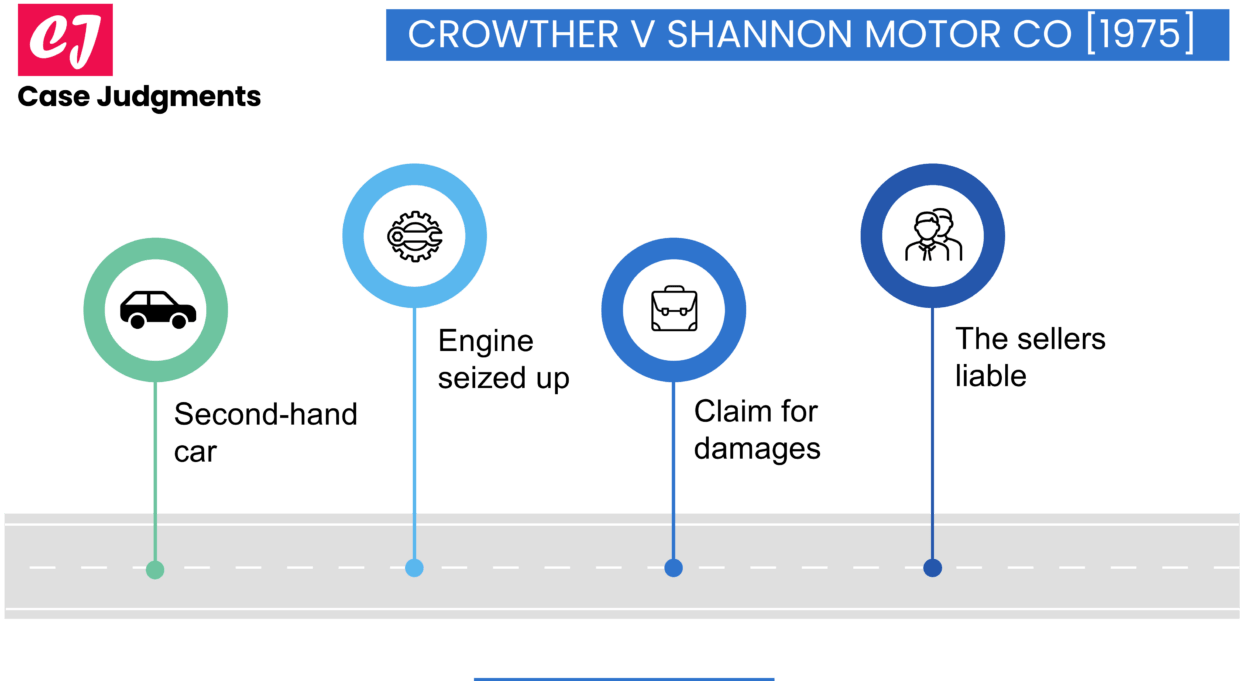
Crowther v Shannon Motor Co [1975]: Summary
Case name & citation: Crowther v Shannon Motor Co [1975] 1 WLR 30; [1975] 1 All ER 139
- Court and jurisdiction: Court of Appeal (Civil Division), England & Wales
- Decided on: 07 October 1974
- The bench of judges: Lord Denning M.R., Orr and Browne L.JJ.
- Area of law: Implied term as to quality and fitness for purpose
What is the case about?
Crowther v Shannon Motor Co is a UK case concerning the sale of a second-hand motor car and the assessment of its durability.
Facts of the case (Crowther v Shannon Motor Co)
An eight-year-old Jaguar car having about 82,165 miles on the odometer, was bought for £390 from the defendants. After purchase, it was driven over 2,000 miles by the purchaser for a period of three weeks before the engine collapsed. The engine seized up and it had to be replaced competently. An action was brought by the purchaser for damages from the dealers.
The purchaser claimed that he had relied on the defendants’ skill and judgment when selecting the car for purchase. In addition, during evidence at the trial, from a previous owner of the vehicle, it appeared that the defendants were fully aware that the engine was in a bad condition and was unfit for its intended use.
Issue
Was the car not fit for purpose? Was the seller liable for a breach?
Judgment of the Court in Crowther v Shannon Motor Co
It was held by the Court that the defendants had committed a breach of Sections 14(2) and (3) of the Sale of Goods Act 1979 (or the corresponding sections of the Sale of Goods Act 1893). There was a breach of the condition of merchantable quality and the vehicle was not fit for its intended purpose. The Court was of the view that a car is expected to go for a reasonable period after the sale. Also, the purchaser had clearly relied on the defendants’ recommendations, and he had the right to assume that the defendants had selected items of their stock with the requisite degree of skill and care. It made no difference whether the items were new or used.
Second-hand goods and their merchantability
It is obviously unrealistic to expect buyers to assume that secondhand goods meet extremely high standards of quality or that they are fit for their intended purpose. However, merely because the goods are second-hand does not absolve the seller of liability for Section 14 violations relating to the issues of quality and fitness for purpose. The buyer will have the right to presume that the seller has demonstrated the necessary level of skill and care required by Section 14 of the Sale of Goods Act when it comes to selecting items of his stock.
In a nutshell, the implied terms of quality and fitness in Section 14 also apply to used items sold by the seller in the course of business.
List of references:
- https://www.hoddereducation.co.uk/media/Documents/Scottish/QR-4-1.pdf
- https://vlex.co.uk/vid/crowther-v-shannon-motor-793051021
- https://scholarworks.umt.edu/cgi/viewcontent.cgi?article=1774&context=mlr
You might also like:
More from sale of goods:

